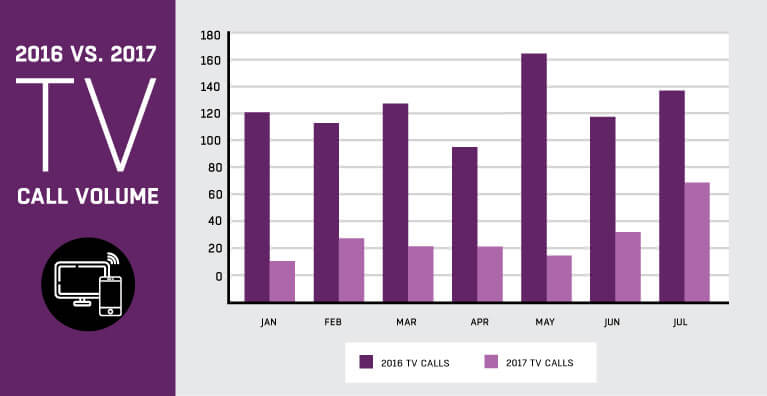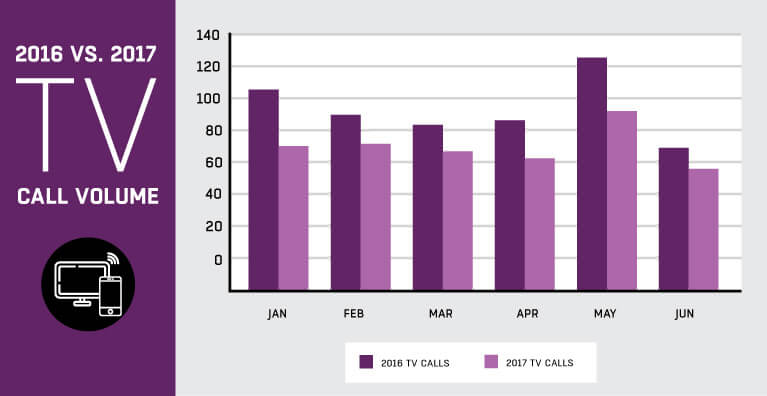Legal Marketing Case Studies: What Happens When Firms Cut TV

Television’s in decline, and the future of your law firm marketing—and your strategy to get new cases and more revenue—is entirely on the internet. Right?
Well, not exactly.
True, you might hear reports about TV advertising eroding. Yes, digital marketing can target exactly the prospects who are looking for your firm. And it’s growing.
But TV still has a unique ability to drive interest in your law firm, even before your potential clients realize they need to start searching for lawyers on Google. You shouldn’t count it out just yet.
While the internet has the power to reach people in a specifically targeted way, TV has the power to expand the pool of people you reach.
Wondering if you should stop—or start—TV?
In this blog post, we’ll share what we’ve experienced at our national legal marketing firm, including real results from two law firms that grappled with this decision.
Why Law Firms Shouldn’t Ditch TV Ads
Consider these takeaways from recent studies of advertising effectiveness, as shared by Second Wind, an international organization for marketers:
- “Abandoning legacy media channels causes sales to drop,” said a Second Wind article, citing a 2017 study from the Advertising Research Foundation.
- About 80% of people trust TV ads, while just 39% trust online ads, according to a 2016 survey by Marketing Sherpa.
Certainly, online advertising has had its share of recent controversy with all the concerns about privacy. But it’s not going anywhere.
The challenges in digital marketing simply serve as a reminder of the durable value of a traditional medium like TV.
As the Second Wind article said: “Traditional media…continues to be the best way to build brand awareness.”
It may seem like everything is changing when it comes to people’s TV-watching habits.
But this is what a speaker from TiVo said at the last annual conference of the Data & Marketing Association (DMA) in New Orleans: Although people are changing how and when they watch TV, they’re still watching TV.
Legal Marketing Case Studies: What Happens When Your Firm Cuts TV?
Here are two recent stories—shared by Firmidable Media Manager Mandy Lee—about law firms (names withheld) who experimented with cutting their TV advertising:
Firm #1: A regional firm practicing personal injury, workers’ compensation and Social Security Disability law.
After TV Stops, Calls Drop Sharply

After years of running year-round TV ads, a law firm decides to put TV on hold for six months as the partners review their strategies for attracting more cases and growing firm revenue.
The partners want to see what effect the loss of TV will have—while continuing their search engine optimization (SEO) program for the firm’s website.
Naturally, TV call volume drops rapidly in the absence of the TV ads.
The firm experiences a dip in new cases at first, but nothing too alarming as the partners focus more on future planning.
But then the firm sees a 23% drop in visitors to its website and a 12% drop in client leads coming from the website compared to the same months the previous year.
The experiment reveals an important dynamic: The TV campaign and website were working hand-in-hand to bring in new cases.
The result: The partners quickly realize they need to reinstate TV.
As the firm goes through this process, the lawyers also witness the enduring law firm branding power of TV.
Even with their TV ads dark for months, they keep receiving calls from the phone number they used in their ads and have clients tell them that TV was how they heard about the firm.
The firm’s TV message stayed with people.
Firm #2: A metropolitan firm practicing Social Security Disability law
After TV Reduction, Calls Slip Accordingly

Because of a shortage of Social Security administrative law judges in its area, the law firm experiences a drop in the number of disability hearings that it’s handling. Along with that, cash flow suffers.
The firm moves forward, but with a smaller staff. And firm leadership decides to scale back TV advertising, so they cut the monthly budget by 25%. The partners want to test what effect this move will have on the firm.
Because the firm is short-staffed anyway, the initial drop in cases isn’t a big problem.
Soon, however, the firm sees a decline in TV calls—compared to the same six-month period the year before—almost exactly in line with the 25% cut in the TV budget.
And, as with Firm #1, the firm’s online results fall off, too, even though the firm slightly increased its digital marketing budget. Again, TV and internet are working together.
In the end, keeping TV turns out to have a direct correlation with keeping up firm revenue.
Result: The firm reinstates its original TV budget.
How to Decide Your Firm’s TV Strategy
Your law firm marketing must be multifaceted.
Every marketing channel has its own role to play in your overall approach. At every point along the path a client takes toward hiring a lawyer, you want them to see your firm.
TV is an important piece of that process—and provides some of the clearest results, as experienced by Firmidable clients around the country.
But TV is also an entire, distinct discipline of its own. Doing it right takes specialized expertise.
The Second Wind article noted that with the explosion of digital marketing, many marketing agencies focus only on digital. This has resulted in a loss of traditional media knowledge at many agencies.
So it’s harder to find an agency like Firmidable, where a versatile team can orchestrate law firm TV advertising, digital marketing and other marketing strategies all under one roof—maximizing the benefits of coordinating between every medium.
If you’re interested in analyzing how TV advertising still fits into your firm’s overall mix, give us a call.
We live in a world where the internet is revolutionizing marketing, but TV is far from dead.
Firmidable is the nation’s best legal marketing agency. We know more than anyone about how Americans choose their lawyers.
